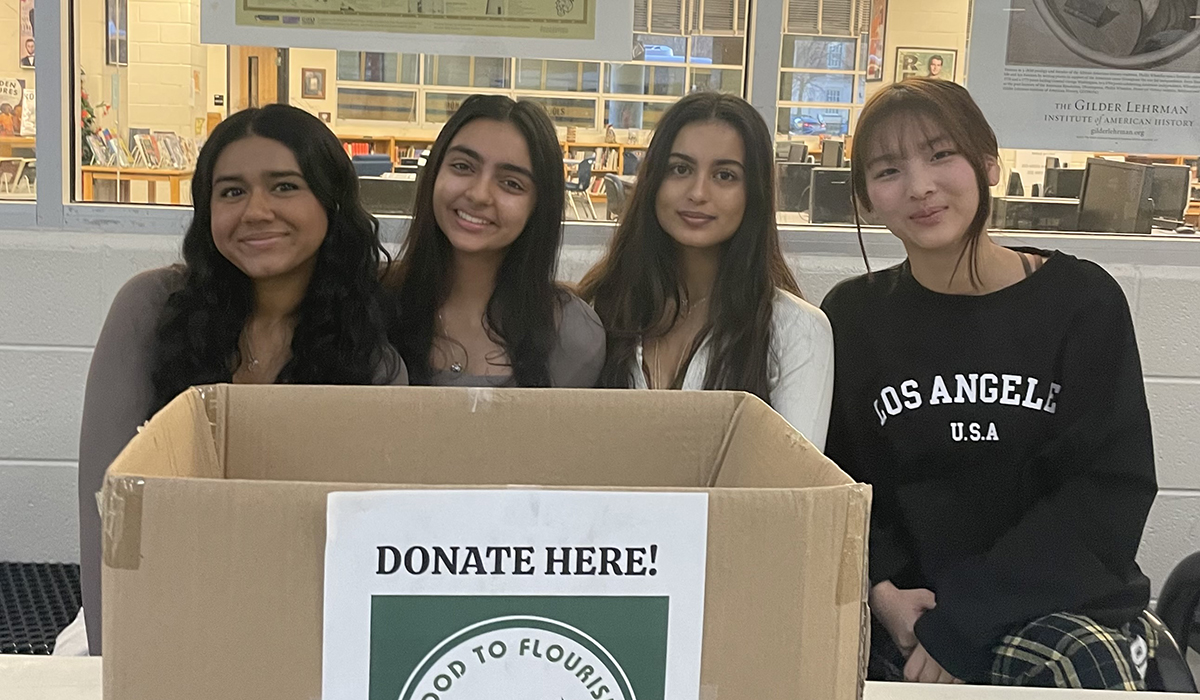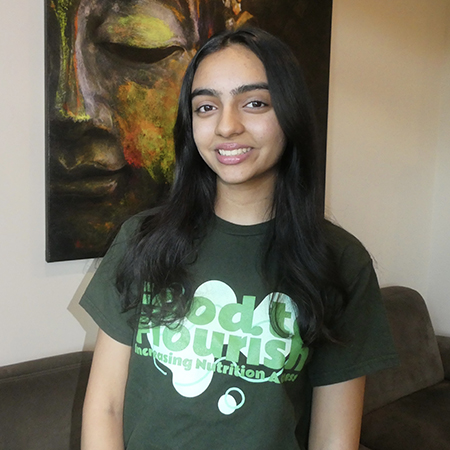The Seed Exchange Revolution: A Grassroots Solution to Nutrition Insecurity

Meet Daily Point of Light Award honoree Barkha Bishnoi. Read her story, and nominate an outstanding volunteer or family as a Daily Point of Light.
Barkha Bishnoi, a high school student with a deeply rooted passion for community well-being, is the founder of Food to Flourish , an organization dedicated to tackling nutrition insecurity head-on. Her inspiration blossomed from time spent volunteering at local food pantries, where she recognized the persistent challenges families faced in accessing nutritious food. Rather than feeling discouraged, Barkha decided to take action and cultivate a solution, driven by the belief that healthy eating shouldn’t be a luxury. Her commitment to breaking down socioeconomic barriers has led to a hopeful, grassroots initiative that’s making a tangible difference in communities.
At the heart of Food to Flourish is the “Plant It Forward” initiative, a brilliant concept that leverages the community power of public libraries. Barkha began establishing seed exchanges in these libraries to provide free access to gardening materials for everyone. This simple yet profound idea empowers families to grow their own food, directly addressing food insecurity and promoting long-term health. The initiative is built on the hopeful idea that change starts with planting a single seed, a first step that all families, regardless of income, can take toward greater self-sufficiency and better nutrition.
Barkha’s vision and dedication have yielded remarkable results. Through Plant It Forward, she has already contributed to seed exchanges in public libraries across an impressive 25 states in the United States. Her efforts have directly impacted almost 6,000 families by providing them with free seed packets, significantly increasing gardening access. Beyond the seeds, Barkha also leads educational events, including webinars featuring USDA experts, to share knowledge about nutrition and sustainability. To support her mission, she has also successfully raised $4,000 through grants and fundraisers.
Barkha also authored and co-published a book featuring 60+ sustainable recipes, aiming to share the importance of nutrition and reducing food waste with other youth. Spending approximately 20 hours a month on her various projects, with a focus on Plant It Forward, Barkha Bishnoi is helping to create a healthier future for thousands of families across the nation.

Tell us about your volunteer role.
I’m the co-founder and president of my organization, which is called Food to Flourish. This is a youth organization that’s dedicated to addressing both nutrition security as well as food sustainability. I lead a team of entirely youth volunteers, coming from several states including Maryland, New York, Pennsylvania and others. Our main goal is to develop community-based projects to promote our goals of nutrition, security and sustainability. Through my volunteer role, I oversee all of these departments, which include advocacy and policy outreach and social media.
And lately, I’ve also been focusing especially on our “Plant It Forward” project, which is our flagship project to establish seed exchanges in public libraries across the country. Seed exchanges involve people both taking and donating seeds, for free, to make home gardening more accessible to everyone.
Tell us more about why nutrition security and sustainability is so important to you.
I’ve been vegetarian my whole life, so from a young age, I realized how limited food options can be for people with dietary restrictions, especially in schools. I noticed in school lunches, particularly, there was really a lack of access for people who had these restrictions. Many of my classmates relied on school lunches, but didn’t really have healthy or inclusive choices that they could eat.
Later, I spent a lot of time volunteering in food banks as I entered high school, and I noticed that a lot of the donated food was really heavily processed and didn’t really have much in the way of nutritional content. The most common item I saw was Ramen. Food banks, of course, do incredibly important work, but I realized that the quality and nutritional value of what’s available created a gap between food access and food quality. That gap is what inspired Food to Flourish.
What are your long-term plans or goals for the organization?
Overall, going beyond just food access and addressing the nutrition security and food security overall is a big part of our mission. I want to expand Plant It Forward across all 50 states. Currently, we have established seed exchanges in 25 states across the country, but I would love to reach all 50, and we definitely want to continue all of our local, community-based initiatives as well.
We’ve already published a book on sustainable recipes, which have included youth creations, youth contributions and creations. We want to continue doing work like that, and we host a lot of webinars where we hear from experts in this field. We’re also trying to take excess waste from restaurants and redirect that to homeless shelters. We want to continue reaching out to our community through ways like that, as well as working toward new ways to increase access to fresh produce.
What have you learned through your experiences volunteering?
Taking that first step was something that I learned was incredibly important. When you commit to a cause that you care about, you not only have to contribute to the solution, but also inspire others to do the same. I think gathering that team around this effort was a huge part of this, and getting all of our youth volunteers passionate about it and engaging them as much as we can is so, so important in getting our work done and spreading our mission too. I definitely learned not to be afraid of taking those initial steps and getting our project off the ground.
I would also say that it’s important to try to achieve things that you may not at first think you can do. When we first started, just a little less than two years ago, I wouldn’t have thought we would expand it so far around the country, especially considering much of our team is based on the east coast. So being able to have a seed exchange all the way in California, for example, was really great for us, and it kind of showed me how far you can go if you have that dedication and if you really want to work toward it.
What’s been the most rewarding part of your work?
Seeing impact firsthand. When a public library shares their stories about families coming in to take the seeds or just sharing pictures of their project, that’s honestly incredibly rewarding. I love it whenever we get an email from a library that’s requesting more seeds and updating us about the project going on. That makes me really happy, because it shows that these seeds are actually being put to use in these communities, and they even want more.
Why is it important for others, especially youth, to get involved with causes they care about?
Youth bring a different dimension of passion to causes because often they’re seeing things firsthand. My first experience was seeing school lunches, and that kind of sparked my own interest. And I know a lot of other youth see other inequalities within their schools, within their communities, and I think this firsthand experience really gives them another aspect to solving the problem.
Plus, having youth involved is inspiring for a lot of people. I know when I’ve been working with people, I always have great conversations with adults. They love having a youth voice in it. Oftentimes you might think that your voice won’t really contribute. But when actually getting out there talking to these people, I see that they value it a lot more than I would have ever thought.
Any advice for people who want to start volunteering?
Start with seeing where your interests intersect with a need. Think about issues that genuinely matter to you and see if any organizations in your area are already working towards that mission. Even if you can’t find an already existing organization, don’t be afraid of starting something new. Passion is really contagious, so you’ll be surprised how many people want to help once you take that initiative. Think creatively, and experiment with different things to see what works best.
What do you want people to learn from your story?
You shouldn’t ever feel like you can’t make an impact – whether it’s resources, age, whatever factor it is. All our projects we started from the ground up. We got grants. We worked with libraries that were already there. We reached out to a bunch of people we didn’t know before. Seeing a problem, caring enough to do something about it, actually doing something about it and bringing others along with you really does create change.
Do you want to make a difference in your community like Barkha? Find local volunteer opportunities.